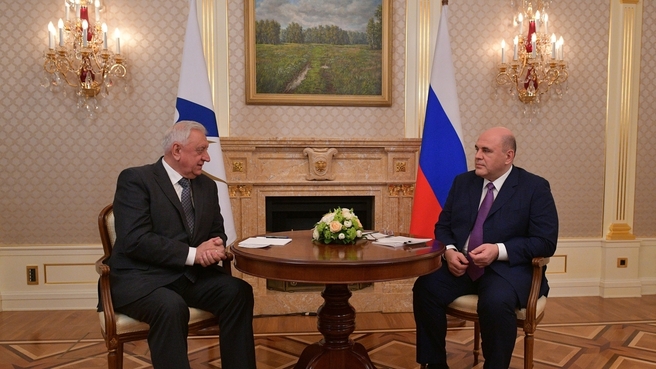The parties discussed relevant aspects of integration within the Eurasian Economic Union.
Excerpts from the transcript:
Mikhail Mishustin: Mr Myasnikovich, I am delighted to welcome you to Moscow. I would like to congratulate you on your appointment as Chairman of the Board of the Eurasian Economic Commission. Last year we celebrated the fifth anniversary of the Eurasian Economic Union (EAEU). We take a positive view of the integration dynamics. The legal framework for the EAEU has been coordinated, substantial powers have been assigned to the Eurasian Economic Commission, and we have reached practical results regarding the development of our common markets and production and marketing links. We are now working on the four most important freedoms: the free movement of goods, services, capital and workforce.
The Board, which you are chairing, has been set an extremely responsible job: to coordinate the given countries’ actions aimed at expanding their economic cooperation. It is necessary to include new spheres into the integration contour, primarily the digital economy, which we discussed in great detail at our meeting in Almaty. I know that you visited the Federal Tax Service yesterday to see the operation of the digital platform and services.
Mikhail Myasnikovich: It’s fantastic!
Mikhail Mishustin: Thank you. This can also be used as the basis for the further development of the EAEU. The investment attractiveness of our market, economic growth and prosperity of our citizens will depend on the effective operation of digital services. We are open to any new initiatives designed to improve the operation of the EAEU bodies. Russia is ready to assume any commitments or, if you like, the powers of the driver of Eurasian integration. It goes without saying that we should also finish drafting a strategy of Eurasian integration to 2025 and discuss it at a regular meeting of the Eurasian Intergovernmental Council scheduled for 10 April in Minsk. As far as I know, you have visited the other capitals of the five member states and held talks with their leaders. It would be interesting to know your opinion.
Mikhail Myasnikovich: Thank you, Mr Mishustin. I was acting in accordance with the instructions I received from the EAEU heads of state at my appointment in St Petersburg on 20 December 2019. In particular, they supported the idea of President Vladimir Putin that I should visit all the [five] capitals to discuss both current affairs and future goals, and to update the heads of state about the results of these consultations. The next meeting of the Supreme Eurasian Economic Council will be most likely held in Minsk on 19 May.
I would like to discuss this topic with you. I have formed an opinion on the requirements and instructions issued by the heads of state and their governments, plus the officials who are in charge of integration matters. Over a period of the past 90 days, I had an opportunity to review the work of the staff of the Eurasian Economic Commission. I would like to outline this and discuss proposals and observations on ways to improve our operations with you.
In principle, I would like to say that there are quite a few key problems that must be resolved, as I see it. This would boost our integration.
There is a degree of uncertainty and a gap between the high level of political decisions on integration taken by the heads of state and government and our practical efforts.
We have tried to bridge this gap through the use of the instruments and mechanisms of the strategy of Eurasian integration to 2025 you mentioned. The importance of this document lies in the direct application of the principles it stipulates, as I see it. In other words, it has fewer high-sounding statements and more practical proposals, as you can see from the names of the proposed actions.
Our current efforts are designed to prepare the ground for further action and to report our readiness at the meeting of the Eurasian Intergovernmental Council on 10 April. There are some uncoordinated positions. I don’t think many of them will remain uncoordinated for long though. We plan on holding a preliminary discussion on them at a meeting of the Eurasian Economic Commission’s Council on 16 March and on reporting our achievements to the heads of government. This is all I planned to say about the strategy.
I would also like to share my views on bilateral relations within the framework of the five-country union and to discuss some other general issues with you.
<…>










